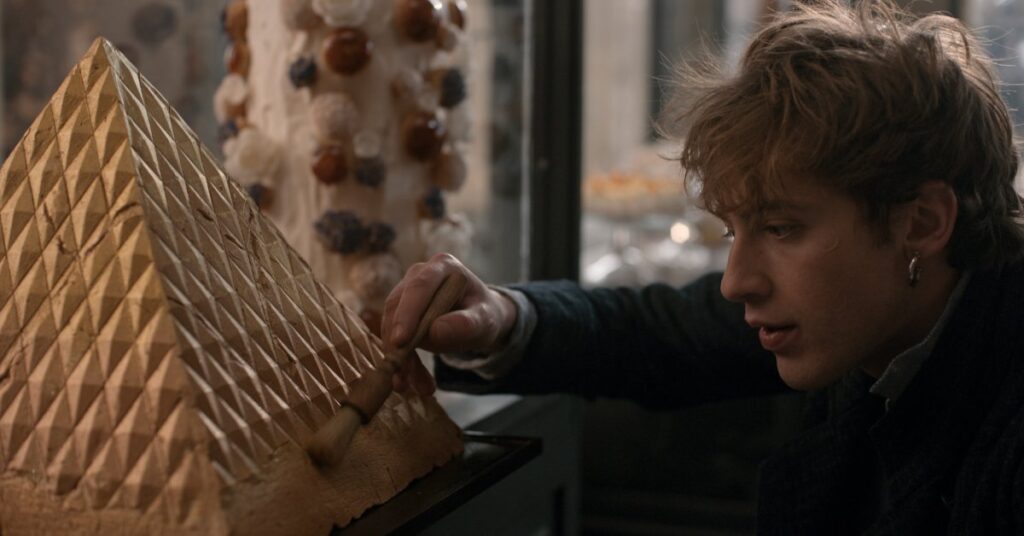A new period drama on Apple TV+ is serving up the story of the first celebrity chef, Antonin Carême.
Carême takes place during the reign of Napoleon Bonaparte after the French Revolution. The chef, played by Benjamin Voisin, is hired by a French foreign minister Charles-Maurice de Talleyrand-Périgord (Jérémie Renier) to make creative pastries that will impress the people with whom he’s negotiating.
Here’s what to know about the real chef who inspired Carême.
What the real Carême is known for
“He’s the first chef ever to become rich and famous publishing cookbooks,” says Ian Kelly, the creator of Carême who wrote the book that inspired the show, Carême: the First Celebrity Chef. “Carême coined the phrase in his second cookbook, ‘you could try this yourself at home.’”
He also pioneered the chef’s hat, wearing a stiff white hat that was taller than the white caps worn by the cooks that worked for him. In an early example of a celebrity chef endorsement, he directed readers to a shop where they could buy one for themselves.
Many of his famous recipes are hard to DIY, however. Classic French dishes Carême pioneered included vol-au-vent, filling a puff pastry with savory foods, and tournedos Rossini, a French steak topped with foie gras. He once said, “My soul is utterly French, and I cannot live except in France.
Food has long been a form of diplomacy in France, a way of showcasing the best of the country with its allies. And Carême was a “passionate artist who wants to have food and being a chef taken seriously as an art form,” according to Kelly.
In the show, for example, Carême brings out a large triangular structure covered in thin paper, and when he lights that paper on fire, it reveals a triangular tray of pastries for a British ambassador with a big sweet tooth. This stunt exemplifies something that Carême once said: “I believe architecture to be the first amongst the arts, and the principal branch of architecture is confectionery.”
The period in which the show takes place, the turn of the 19th century, greatly shaped French cuisine. According to Kelly, as on way to cope with the trauma after the revolution, the French turned to food. “There weren’t restaurants in Paris before the revolution, and the idea of gastronomy was born of this period,” Kelly explains.
The mystery of Carême
There’s plenty of dish in the show beyond the kitchen.
In the show, the only thing bigger than Carême’s appetite for food is his sexual appetite. He’s a hit with the ladies, having flings left and right, including seducing Napoleon’s beloved Josephine. Their affair is a creative liberty taken by the show, but the story is inspired by Josephine’s life. In reality, Josephine couldn’t bear children, and wanted to ban divorce in France to prevent Napoleon from leaving her. “That’s all historically accurate,” Kelly says. Carême gets caught up in that mess because he ends up cooking for Marie-Louise Habsburg, a woman who is brought to marry Napoleon and give him an heir to the throne.
As to how much his high sex drive in the show is based on real life, Kelly says, “We don’t know much, but what we know points very definitively in that direction.”
Kelly says there was a lot of room for creative license because so little is known about Carême. While the chef would boast that his foods have medicinal properties—especially his soups and consommés—the scene in which he uses bitter herbs to cure Napoleon when he’s ill is fictional.
Stories he told about his childhood are also hard to verify. The chef claimed that his family abandoned him when he was nine years old, and he was taken in by a baker.
“He was a myth-maker,” says Kelly .
A sharp tongue
Kelly’s book is chock full of nuggets of wisdom from the chef. Carême saw cookbooks as a chef’s greatest legacy, writing in 1830, three years before his death, “Our only duty, after cooking, is to record and publish. If not, we will suffer such regrets.”
He was a firm believer that dinner party meals should last at least two hours, ideally three or more. And he did not hold back when talking about people who don’t like food, once writing, “The rich man who is miserly only eats to live, lives his life in mediocrity, and dies in it too” and “a rich man who does not appreciate a good cook will never know ineffable joy.”
He had even harsher words for people who show up late to a restaurant reservation: “The guest whose tardiness delays the meal should have the dining-room door slammed in his face.”
Read the full article here


